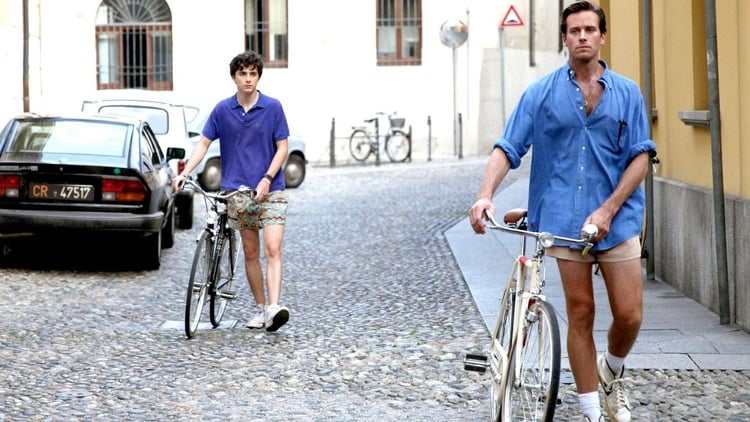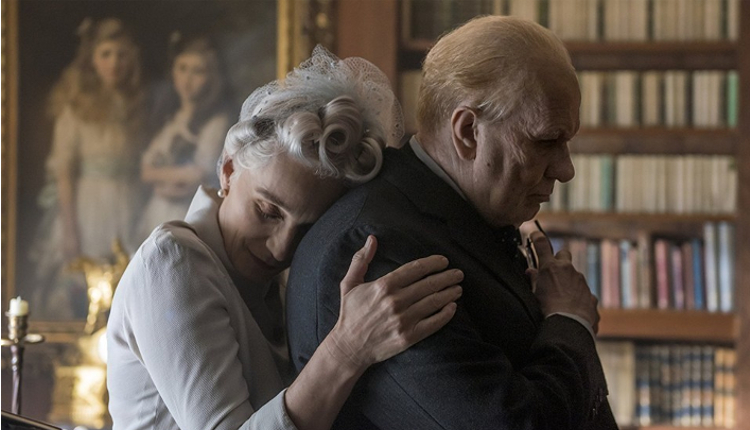For Your Consideration | Why Call Me by Your Name is the Best Picture of the Year
This article contains spoilers.
“It makes me want to love,” a young woman said behind me as we were leaving the theater after a showing of Call Me by Your Name. She was a stranger and she wasn’t even talking to me. I turned to her and smiled anyway. She smiled too.
“Isn’t it heartbreaking?” she asked me.
“Oscar-caliber” movies have a penchant for breaking our hearts, usually relying on dramatics, politics, or intense personal tragedy to do so. Call Me by Your Name is certainly poignant and, yes, even heartbreaking, but not for the reasons one might assume.
[perfectpullquote align=”right” bordertop=”false” cite=”” link=”” color=”#F42A2A” class=”” size=”16"]No terrible, or even unfortunate, historical events are used as catalysts for action, plot movement, or climactic shock [�[…]he opposite is in fact true: on its surface, this film is sleepy and simple; it feels like a lazy, hot summer.[/[/perfectpullquote]p>
Taking place in sunny northern Italy in 1983, the film follows precocious 17-year-old Elio Perlman (Timothee Chalamet). The movie opens on the arrival of Oliver (Armie Hammer), a 24- year-old American graduate student who comes to stay with the Perlmans for the summer as a research assistant to Elio’s father (Michael Stuhlbarg).
Directed by Luca Guadagnino and written for the screen by James Ivory, Call Me by Your Name is based on Andre Aciman’s novel of the same name. Since its debut at Sundance, the film has been lauded as a stunner, a beautiful, sensual coming-out and coming-of-age drama.
And it is. But Call Me by Your Name is much more than that.
I almost hesitate to call the film a drama because there is an absence of the prescribed drama we’ve come to expect from an Oscar nominee for Best Picture. This, to be clear, is to its credit. Call Me by Your Name is surprisingly positive, but this isn’t new information. Reviews have been almost unanimous in citing this refreshing element as a particular strength of the film.
An even bigger strength? Call Me by Your Name defies Oscar “bait-y” conventions. This movie is not an extravagant epic, nor a period drama. We see no groundbreaking production design or gratuitous cinematography. No terrible, or even unfortunate, historical events are used as catalysts for action, plot movement, or climactic shock. No time is wasted on stigmas, on political messages or obvious, seen-it-a-million-times pain. The opposite is in fact true: on its surface, this film is sleepy and simple; it feels like a lazy, hot summer.

But judging by its trailer, Call Me by Your Name appears exquisite. It looks stylized and recognizable in the same way many critically acclaimed films do. I feel like this very well could have been intentional. A genius misdirect. After seeing the trailer, I went into the theatre thinking I knew what this movie was going to be: a love story between two men, clouded by prejudice, unable to escape hatred and self-loathing even in the dreamlike beauty of Italy.
And then the movie started.
I prepared myself for doom. What would it be? The inevitable AIDS epidemic? Toxic disapproval from Elio’s family? There is a scene in which Elio and Oliver are drunk and horny and singing and dancing, winding through labyrinthine Italian streets at night. I remember holding my breath. I anticipated someone, a police officer or bully or even a friend or family member, emerging from the dark shadows to chastise or abuse them, because a movie with a central romantic relationship between two men has to be met with some sort of tragedy, right?
Homophobia must take center stage at some point. We’re conditioned as viewers to feel this way. A movie with Oscar buzz has to be a story of external bigotry and spotlight the ugliness of society. A statement must be made and the more struggle, the better.
Herein lies Call Me by Your Name’s magic. My assumptions? Wrong. My preparations? Unnecessary. The profound beauty of the film is that the story is enough on its own, without all the drama and shame. Luca Guadagnino crafted a deeply affecting and earnest film—and it doesn’t need any tropes or catastrophes to befall its characters to leave us utterly moved.
Even subtle yet normalized obstacles are ignored. Elio and Oliver do not have a shattering fight. They do not rob themselves of experiences because of assumed shame. When they plan to meet at midnight, nobody loses track of time. Elio doesn’t forget about his watch. Even in few words, they express themselves truthfully, taking convenient misunderstandings out of the equation. Again and again, they simply find each other. They submit to feeling—and it feels damn good.
So, what’s the point of the film then, if not to show despair and discrimination to teach us how to be “good”?
Maybe ignoring all of that is the point. Or, more accurately, perhaps a movie with love at its center can be, simply, a love story—and Call Me by Your Name is intoxicating in its depiction of falling in love for the first time during those crucial, formative years of one’s life. It is unabashed and never cynical, celebrating connectivity and desire rather than cautioning against it. In a world that feels hateful too much of the time, Guadagnino’s message rings clear and true: love, when it’s found, is life-altering. It can bring out our best. It can even free us. Free us from hate, fear, and in the film world: tired, obvious clichés.
It is a new and stunning experience to watch Call Me by Your Name and, believe it or not, it’s not just because of the lush Italian countryside. That’s not to belittle the power of place in this film. The setting provides Elio, Oliver, and the viewer with a place of warmth and comfort. The people are kind and their intimacy is largely unchallenged. Everything is contained. Safe. Beautiful. Unhurried. But there is something else at play here.
What makes this film more than a pretty face is the fact that it manages to leave ugly politics off the table but never even once verges on the shallow. There is still raw emotion and risk, even with an air of generosity, care, and protection. Elio’s parents accept his sexuality and exploration, so he is free of familial pressure. In fact, Michael Stuhlbarg delivers a profound, tear-jerking monologue toward the end of the film and it is in this speech that Call Me by Your Name blossoms and undergoes a breathtaking metamorphosis. As we hear Mr. Perlman talk to his son, it’s clear that Call Me by Your Name is about as heartbreaking as it gets, but it’s because of relatable internal “drama”: the drama of growing up and into ourselves, of falling in love with the knowledge that time is limited. The bittersweet nature of a romance with a due date.
I’d never call this movie a gay love story. Such a distinction doesn’t need to be made and that’s rare. But here’s a worthy distinction: it’s a love story we’ve seldom seen before, because it’s about more than loving another person. It’s also about learning to love ourselves. Oliver and Elio’s sexuality isn’t the focal point. This is a challenge, and criticism, for some viewers. As people, we find titles comforting. We feel the need to know and understand a person and compartmentalize who they are, but what is groundbreaking about Call Me by Your
Name is that these ambiguities exist—and they don’t matter. This, rather than baffling an audience, should be yet another point of praise.
Does it matter if Elio is gay, straight, or bisexual? Does it matter for Oliver? Does it matter that Mr. Perlman admits to his son that he has never had a relationship or connection with as much weight as theirs? Does this mean that Mr. Perlman himself is gay, or simply missed the opportunity to find true, brazen love? The answer is that none of these specifics make a difference because this film is about more than labels and sexuality. It’s about being who you are and allowing yourself happiness, in whatever form it takes, regardless of pain or heartbreak.
Even with the absence of prejudice and external threat (from society, illness, etc.), Call Me by Your Name is resolute in its honesty and authenticity. This has a lot to do with Chalamet’s revelatory performance and Hammer’s intense, vulnerable, and layered Oliver. Both actors maintain charming playfulness and hesitancy with pitch-perfect believability. Their relationship is consuming, sweet, and awkward—much in the same way a defining first love is.

Shortly after seeing the movie, I spoke to a colleague and explained that I found the film to be surprising and affirmative and triumphant and, in my opinion, the best picture of the year. He rolled his eyes and said that after Moonlight’s much deserved 2016 Best Picture win, the Academy would never give it to “another film about a gay romance” a year later. This left me cold. How many consecutive years have we given Best Picture awards to movies with a central heterosexual relationship? And why does it even matter? To write off Call Me by Your Name because it explores a subject that has been explored before—and explored well— is to devalue art, because great art doesn’t have to be completely original. As a matter of fact, it can’t be.
Art, at its best, isn’t about reinventing the wheel, but giving it a new spin. It’s exponentially more difficult to make it a spin that is universal, delicate, and heartfelt, but Call Me by Your Name succeeds with flying colors. When the movie ended (and what an ending it was!), I left the theater in tears, not because I had just witnessed a shattering tragedy or felt overwhelmingly sad, but because I felt open. I felt that I had just learned more about love and its complex power. We could all benefit from such a message.
I’ve read many rave reviews for Three Billboards Outside of Ebbing, Missouri, Darkest Hour, and The Post. I don’t need to share my qualms about these films, nor do I need to cut them down. In their own right, they are all worth seeing. However, there is something I feel needs to be said.
I hear so often that movies like Three Billboards and Darkest Hour are “timely” and “brilliant.” Sure, perhaps they are timely, but they are also shoehorned into our consciousness and concerned with hitting filmic beats, reminding the audience, time and again, that their stories are apt and political and important. Am I the only viewer tired of run-of-the-mill biopics and their automatic praise? Do we not respect our audiences more? Is power only substantial when it is obvious? When it’s Winston Churchill giving speeches about standing up to a common enemy? There is plenty to respect about Darkest Hour and Churchill’s historical significance, don’t get me wrong. However, do we really connect to this as human beings, especially in today’s political climate, when emotion is exchanged for rhetoric?

I’d urge an audience, instead, to see a movie that demands inclusion without preaching it to us, regardless of what is happening in the news. I’d want an audience to witness something understated and – dare I say – even more powerful than full-circle, carefully engineered orations. I want theatres packed with people to see a film centered on love, because if we learn to love and accept and include each other in everyday circumstances and settings, and if we’re taught that giving into our hearts and souls and desires brings out the best in us rather than the worst, then I’d wager there would be a lot less hate in the world, particularly the kind that we respond to with more animosity and walls and guns and wars and finger wagging. Call Me by Your Name is important without having to remind us that it is. Elio doesn’t need to have a ten-minute monologue on the trials of sexuality or homosexuality or bisexuality or being curious or confused. The film doesn’t need to address us, nor does it need to remind us that its characters are struggling. They’re humans first, not symbols.
And the love, that beautiful, aching love? It’s enough that it exists, which is much more impressive to me as a viewer, not to mention more “timely” and “brilliant.”
A movie set in idyllic northern Italy, full of intellectuals with artistic backgrounds sounds pretentious and it could have been. Call Me by Your Name ran the risk of being that art house movie of the year, but it surprised its audience by being accessible and generous and good-natured and joyous.
During the showing, the theatre was silent. The woman next to me was literally leaning forward in her seat, smiling and laughing and, toward the end, crying. There is a very real sense of belonging as one watches a movie like Call Me by Your Name. It’s such an immersive and authentic story that the experiences and emotions witnessed might as well be happening to the viewer. Something I’m really starting to admire is when a film appears to be one thing but then subsequently smashes stereotypes and gives us something different. Call Me by Your Name is free to be what it is because it falls into no traps, no formulaic patterns that many coming-of-
age, coming-out movies tend to stumble into. We’re set-up to feel like “this type of movie” will throw us into a spiral of revulsion and fear and oppression, but it doesn’t. It never does. You can almost see Guadagnino smiling mischievously behind the camera. This film is not a tale of misfortune. It’s about something more tender and honest—and that’s why it’s better. We don’t need to be hit over the head or scared straight by its message, and yet we still get that message and are able to connect with it because we have all longed for love and mourned when it’s over. Regardless of gender or sexuality.
With its recent nationwide release, Call Me by Your Name will surely come into more criticism. I’ve read reviews for this movie which argue that the film is not weighty enough to be in the running for Best Picture, that it’s too “empty” and “easy” and “predatory.” Apart from profoundly disagreeing with these interpretations, I have to ask: why can’t a movie be beautiful and simple and light, when it’s warranted? Why can’t love be shown as something that gives its characters ease and access in an increasingly dark world? Why can’t Call Me by Your Name have moments of pure beauty and profound discomfort? Why does it have to be weighed down with politics and needless drama? Who said?
I think this is a movie that acknowledges prejudice and struggle and risk, but subverts it in the service of something more meaningful. Love can be messy and it can certainly hurt, but such an experience can color our lives, too. This movie chose not to be a cautionary tale, but rather a substantiated love letter that never felt sentimental. It just felt real.
I don’t know if I’ll ever be able to adequately write about Call Me by Your Name or its impact because art, when it’s right, is beyond words. In many ways, this film is indescribable. So, I’ll leave it at this: just because a movie is sensual and beautiful, doesn’t mean it loses depth. Call Me by Your Name is layered and intelligent without being exclusive. It is moving but not sad, complex but not ostentatious. It’s the only contender this year that reminded me of the power of film and what it can do: it can break us open, change us, and put us back together
again.
As we exited the theatre, it hit me that a movie that explores love so thoroughly, even the end of such a transformative experience, still made this woman walking behind me want to love. Despite being heartbroken. Despite being in pain. Despite such a feeling of loss. Let that sink in. A movie that is unflinching in its depiction of sorrow ultimately encourages its audience to navigate life heart-first, rather than curl up into a ball and deprive ourselves of future delight. Such pain, oddly enough, is the very thing that keeps us alive and able to feel, even during our darkest of days, happiness.
“Right now there’s sorrow. Pain,” Mr. Perlman says. “Don’t kill it, and with it the joy you felt.”
That’s life. That’s love. Even with all its grief there is still a reason to smile, just as Elio does, right before the screen fades to black.

